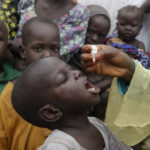Orphans and vulnerable children popular referred to as OVCs are faced with the same challenges of vulnerability as are women especially those who are heads of households.
Community based support in Nigeria (CUBs) in the course of supporting communities and government structures to better deliver services to meet the needs of children who are vulnerable as a result of one or both parents being infected by HIV and AIDS, has brought to the fore factors responsible for the situation and ways through which they can be tackled.
According to Maisha Strozier, head of the research team, “We know there are differences in the way girls and female heads of household experience vulnerability- economic vulnerability, social vulnerability and sexual vulnerability that could lead to the risk of HIV/AIDS. We are not forgetting that there are boys and males that are involved, critically involved in supporting OVCs in the country. But we think there are certain things that are not being met when it comes to girls. They include the fact that girls are removed earlier from schools because of resources that the family will not provide for them. Girls are more physically vulnerable and sexually vulnerable as a result of cultural norms that are being broken down and the social environment in which they find themselves generally and particularly if they’ve lost one or both parents that have been taking care of them.
“So we think that it’s important that the HIV and AIDS response in the country addresses the needs as we find them. What we are looking at is each individual child needs whether they are education, healthcare, psycho-social support, increased income as well as the needs of the household in which these children can be found and looking at those needs and trying to address them based on what we find there. There is no one approach for any family or individual. We find in general in the southern part of the country, you find a little bit more restlessness and out of school vulnerability that are manifested in both girls and boys outside of marriage and outside of the household. Even in the contest of a structured family or family unit we are seeing some vulnerability. In the North we see more boys who may get out due to religious activities so they are away from their family and engaging in activities that may increase their vulnerability and we will address these within that contest.”
The crust of the matter, he further explained, “is the question of how girls are treated across the 11 states; what are the challenges so we can now programme what can be done to help the girls. The research revealed that, there are differences as in the south the girls are allowed to go to school and the boys get to take up care giver responsibility and get into street hawking.”
Audu Mohammed Liman, Chief of Party CUBS, stated that, “In the North the girls are taken out into early marriages not because of the bride price but because the people interpret the Islamic injunction to marry but also it is less burden to the father who feels he has more space to take care of the boys imagining that it is more important to train the boys. We have a lot of work to do in the North to let the parents know that the girl actually when she goes to school can be as good as the boys even better than the boys in supporting the family. And in the South to let those boys who say even if I go to school and finish the university there is nothing for me and to tell them that even if you don’t have anything after school just the fact that your life changes for the better is something that you can’t buy with all the money you can make in trading. They are telling us to provide income generating possibilities that only vulnerable girls can access.
“Due to the fact that there is a lot of vulnerability in girls not having an economic power and those lack of power makes them temporary prostitutes or they have so many men because those men take care of them and help them if they are lucky to go school. For some of them who are married off early, if the marriage doesn’t work out, have nowhere to go so they remain in an abusive relationship or they run off from the marriage and they can’t go back home because they know that their parent would chase them back. They become what you call “Karuwa”, the Northern concept for prostitution slightly different from the southern one but it is all the same sex for money.
“So in the North, they are being pushed to do that because when the fall back home nobody welcomes them. We got some work to do to change the mindset of parent that sometimes the marriage doesn’t work and she has the right to come home and go to school if she wants.”
Although the male OVCs are also vulnerable, there is more focus on the girls because of the high rate of infection among girls, the biological make up of women that makes transmission faster in women as well as the fact that women are also more susceptible to contracting the virus than men.
 Join Daily Trust WhatsApp Community For Quick Access To News and Happenings Around You.
Join Daily Trust WhatsApp Community For Quick Access To News and Happenings Around You.


